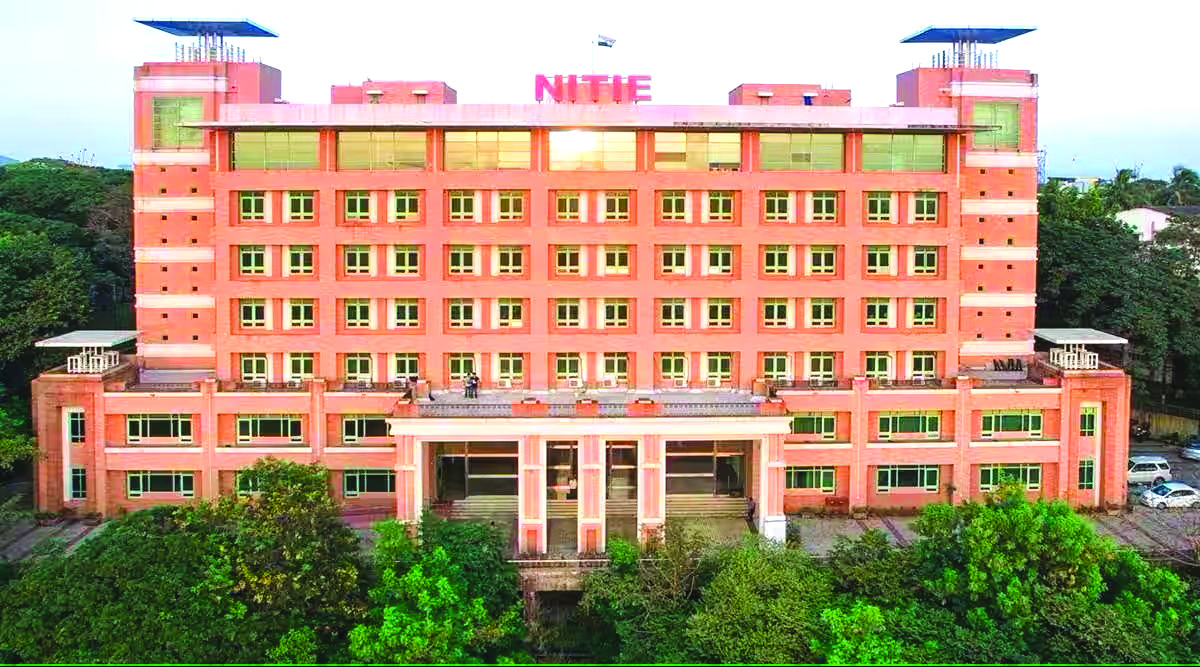Nasrin Modak Siddiqi (Mumbai)

New IIM-Mumbai main block. Inset: Prof. Manoj Tiwari
One of the curious anomalies of India’s higher education system was that until recently, neither Mumbai (nor Delhi) hosted one of the country’s 21 globally famous IIMs (Indian Institutes of Management).
The first IIM was established in Calcutta (now Kolkata) way back in 1961 followed by IIMs in Ahmedabad, Bangalore, Indore and Kozhikode (Kerala). Since then a total of 21 IIMs have been promoted countrywide. However, IIMs A (Ahmedabad), B (Bangalore) and C (Calcutta/Kolkata) rule the roost and are globally recognised for providing global-standard business management education with IIM-Indore and Kozhikode fast closing the gap.
With the Central government promoted IIMs conspicuously absent in India’s financial and commercial capital, this space had been captured by the Jamnalal Bajaj Institute of Management Studies (JBIMS) and several private B-schools, notably the S.P. Jain Institute of Management & Research, and the NMIMS B-school ranked #3 and #4 in the EW India Higher Education Rankings 2023-24. However, this oversight has been resolved by an ingenious legislative sleight of hand.
The National Institute of Industrial Engineering (NITIE) established by the visionary Prof. N.S. Ramaswamy (who also established JBIMS and IIM-B and ceremonially launched EducationWorld in 1999 but died unsung in 2012) as an engineering B-school in 1963, has been transformed into IIM-Mumbai. On July 28, the Indian Institutes of Management (Amendment) Bill 2023 was hurriedly passed by a dysfunctional Parliament which amended the Indian Institutes of Management Act, 2017 to change the name of NITIE, Mumbai into IIM-Mumbai.
“It took a long time coming but we are glad that the efforts of our team have cleared the way. Our efforts and industry will finally get recognition. We have always had programs catering to the emerging needs of Indian industry but despite best quality training, our (NITIE) students used to face challenges with recognition, especially with companies abroad. That will change now. Our heartfelt gratitude to everyone who made this possible including our PM and education minister Dharmendra Pradhan,” says Prof. Manoj Tiwari, former professor of production management at IIT-Kharagpur and founding-director of IIM-Mumbai.
Launched in 1963, NITIE’s conversion by legislative fiat has placed IIM-Mumbai on a par with the country’s top-ranked IIMs. It has inherited NITIE’s 63-acre campus in Powai in land-scarce Mumbai in the same suburb as IIT-B, India’s #1 ranked engineering institute. And the new IIM-Mumbai has got off to a good start with #7 B-school ranking in the latest NIRF (National Institutional Ranking Framework) 2023 of the Union education ministry.
The consensus of academic opinion is that IIM-Mumbai will do well because the IIM tag apart, it has inherited an engineering tradition from NITIE. This will endow it with a differentiating tradition of engineering and manufacturing management at a time when there’s rising emphasis on increasing the value of manufactures in the country’s production and exports.
“Establishment of an IIM-Mumbai has been surprisingly overlooked and was long overdue in Maharashtra, which produces almost 15 percent of India’s industrial output and Mumbai is the commerce and financial capital of the country. IIM-Mumbai will be able to attract high quality faculty from India and abroad, the best visiting faculty from industry and offer students internships and placements in the most respected corporates countrywide. It has a very bright future,” says Priya M. Kenkare, professor (London School of Economics Programmes) at the Podar World College, Mumbai.
Establishment of an IIM in Mumbai is not a new idea. Way back in 1957, a Harvard Business School (HBS) panel had chosen Mumbai. However, when Bombay University insisted that it should be affiliated with it, the proposal fell through. Again in 2001, the City Industrial Development Corporation together with IIM-A recommended a site in Navi Mumbai that was previously offered to the Indian School of Business (ISB) which is located in Hyderabad because the state government insisted on a parochial quota of seats for Maharashtra students. For the same reason, this project was rejected.
IIM-Mumbai’s confidence in the name change is reflected in the institute’s resolve to raise its tuition fees (“subject to approval of the Board of Governors”) to Rs.20.4 lakh for its two-year Masters degree programmes, from NITIE’s Rs.15 lakh. Tiwari defends this on the grounds that this fee is substantially lower than of other IIMs and that the Central government grant to NITIE will cease and “IIM-M will have to become financially independent from next year and start building its own corpus.”
Although IIM-Mumbai has been a long time coming, given the go-getting business culture of the Maximum City, the institute is set to give India’s top ranked B-schools a run for their money.
Also read: Hostile takeover bid 2.0: Indian Institutes of Management Bill 2015





















